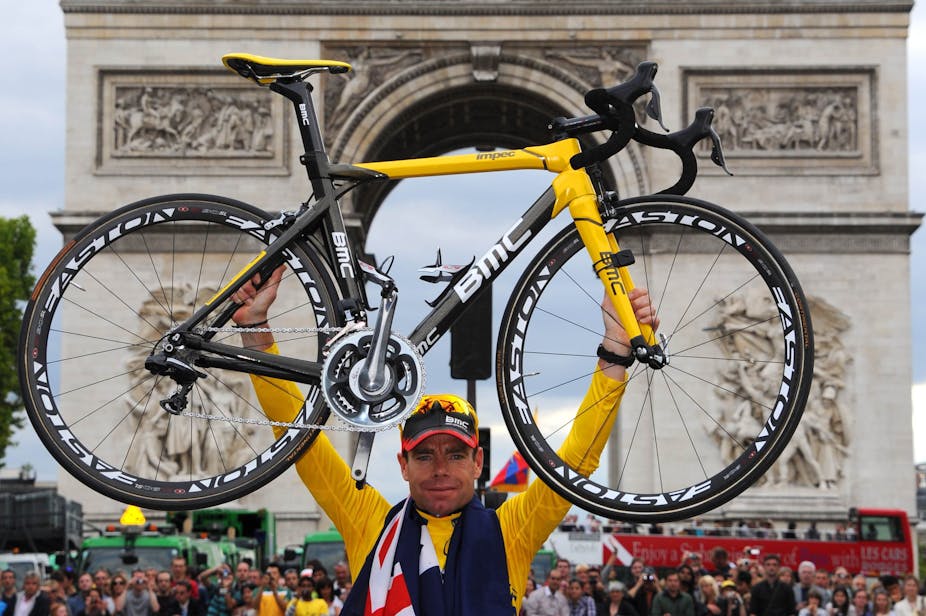CYCLING IN AUSTRALIA: At a Sport Australia Hall of Fame function last night, Australian cyclist Cadel Evans was named winner of The Don award for the year’s most inspirational sporting moment.
In July, Evans became the first Australian ever to win the most prestigious race in world cycling – Le Tour de France.
Cadel’s successful Tour campaign had millions of Australians glued to their TV sets in the wee hours throughout July, but what effect, if any, did his victory have on the Australian cycling industry?
Is there such thing as a “Cadel Effect”?
‘Win on Sunday, sell on Monday’?
Executives at Holden and Ford used to say that if your cars won a race on a Sunday the consumer would buy your car on the Monday.
A similar reaction was seen in the weeks following Cadel’s victory. Sales of road bikes, clothing and accessories increased noticeably, with some stores selling out of BMC equipment – the brand Cadel is sponsored by.

Interestingly, overall bike sales in Australia have been increasing steadily in the past ten to 15 years according to the Australian Bureau of Statistics figures, with 1.4 million bicycles sold in 2010.
(Last year was the 11th year in a row that bike sales have been higher than total car sales in Australia.)
Given these stats, it’s probably wrong to say there will be a huge increase in overall bicycle sales due to Cadel’s victory.
In reality, most Australian bicycle sales are children’s bikes purchased in the Christmas period. If Australia’s population grows to a Treasury-predicted 35 million by 2050 the number of bike purchases will only continue to grow.
Long-term bike sales are not linked to Cadel’s victories nor to the exploits of any other professional cyclist. Bike sales are driven by parents that want to save on petrol by letting little Jack or Lily ride to school.
The ‘Cadel Effect’?
So does the “Cadel Effect” exist in any section of the market? Indeed it does.
Although actual figures are hard to get publicly, most companies will tell you their high-end road bikes experienced a nice bump in sales around the same time Cadel was sipping on a glass of Moët on his way toward Paris.
This sales spike carried into August when Cadel rode down St. Kilda Road in Melbourne to the applause of thousands.
Compared to past years, sales of high-end road bikes were significantly higher.
Lance Armstrong had a similar effect on bike sales in the US when he won his world-record seven consecutive Tours de France from 1999 to 2005.
But the increase in sales due to Armstrong was more sustained due to his long reign at the top and the massive support bike manufacturer Trek put behind Armstrong and into selling co-branded Armstrong team-issue bikes.
Trek used the increase in sales from Armstrong’s association to expand into the commuter and travel market – one of the fastest-growing markets in the bicycle industry.
Spikes after any big promotion or event tend to last only a few months before they start to wear off. To maintain an increase, a company also needs to invest in other aspects of marketing such as promotion, pricing and product design.
Being a high-end and highly specialised brand, BMC will probably not be discounting their products any day soon. If this is the case, the Cadel Effect might be short-lived.
The real Cadel Effect
Fortunately, other areas of the bicycle industry are also seeing a flow-on effect from Cadel.
Corporates – such as NAB and BHP-Billiton – are getting behind Ride to Work days, and you are more likely to see members of the business community networking on the bike (and at the coffee shop afterwards) than during other, more active sports, such as running or swimming.
Bicycle lobby groups, such as Bicycle Network Victoria, now have a brand champion they can proudly show off to the government as someone who will support their cause for greater funding of bicycle lanes and paths.
SBS TV can also approach sponsors for more money for the 2012 Tour coverage as more viewers tune in to watch Cadel try and conquer the roads of France for a second time.
In the growing local professional bike racing scene, the Tour Down Under can count on a greater corporate awareness of cycling.
Green Edge, Australia’s new professional cycling team, is also riding the wave of Cadel fever. It is seeing increased interest from local companies now aware of the opportunity to develop brand awareness in the European and Australian market (through advertising on cyclists’ jerseys, for example).

Although the Cadel Effect is hard to quantify there is no doubt it exists. A rough guess would place its overall value in the millions, spread right across the cycling industry.
How long will it last? Unless Cadel wins a second Tour de France in 2012 we may have already seen the peak – for now.
With a new crop of Australian cyclists rising up the ranks of road cycling – including Richie Porte, a rider some are tipping to be a future Tour winner – it may not be too long before yellow fever strikes Australia’s cycling industry once again.
Read the rest of the Cycling in Australia series.

